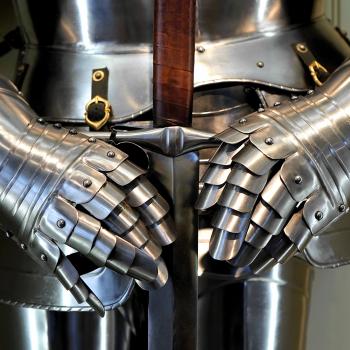To Train Up A Child, pp.
This is the third and last installment in the chapter on children’s natural development. Have you noticed anything Michael hasn’t talked about in this section? Hmm, let me think. How about children’s natural development?
I feel like the way Michael is handling this section is very similar to the way Debi handled her section on sex. Debi never actually told us anything about sex. Instead, she told her readers that men need sex, that men connect their value to their sexual fulfillment, that wives better sexually fulfill their husbands, and that if husbands are sexually fulfilled by their wives their wives will be fulfilled too. Similarly, all Michael has done in this section is tell us that small children do not know right from wrong, that parents therefore need to “train” them into immediate obedience before they figure out how to actually do wrong, and that children will somehow magically learn right from wrong at some point without the parents actually doing anything about their moral development except enforcing obedience. How is any of this any sort of overview of “children’s natural development”?
And in this last section, we only get more of the same.
WHEN DRIVES ISSUE IN SIN
When does this innocent, natural selfishness of a child become sin? In other words, when is a child to blame? Keep in mind that a youth will not come under condemnation until his moral faculties are fully operative.
As the child’s reason and moral faculties develop, gradually there evolves an understanding of moral responsibility and duty. At some point (as moral perception grows to a point where one can be held fully accountable), every youth faces his own “tree of knowledge of good and evil.” (See Deut. 1:39.) So far, everyone (except Jesus) has “eaten” (personally violated his own God-given understanding of right and wrong) resulting in personal condemnation.
Though God will not condemn a child until he is completely matured morally (grows into a state of accountability), that does not mean that the developing child is incapable of moral judgments and responses. When a child sins against his conscience, he is guilty. The degree to which his understanding is developed is the degree to which his actions can be called sin. Again, the sin is not imputed until the child becomes a fully functioning moral being. An unfinished clock, still in the making, may have moving parts, but it will not keep time until every last piece is properly installed.
And the point of all of this is . . . ? I mean, the basic idea is this: Children gain moral understanding gradually over time, but God does not count their sin against them (the gradual sin they commit as they gradually gain moral understanding) until the exact moment they have reached full moral maturity. For some reason, though, Michael appears to think that understanding this basic idea is very very important, so he keeps repeating it.
Anyway, for what it’s worth, this is why Andrea Yates drowned her five young children in a bathtub. After all, if God does not condemn a person to hell until they reach the age of accountability (which in this understanding is actually a specific moment), if you ensure that children don’t reach that age you also ensure that they will spend eternity in heaven. Allowing them to pass that age makes their eternal salvation a risky prospect, as they will only be saved if they accept Jesus’ gift of salvation. In fact, I would argue that within this paradigm, Andrea Yates acted in the only way a truly loving mother can act. Think about it: As she believed, and as Michael teaches, her children would face a significant chance of eternal torture if she let them live, but if she killed them (as painlessly as possible, say) they would be guaranteed eternal bliss. Sure, killing them would be a moral wrong and might land her in eternal torture herself, but at least she would save her children from that fate. And isn’t a mother supposed to sacrifice for her children?
I am not endorsing Andrea Yates’ actions. They were absolutely abhorrent. I am simply arguing that they are the natural result of taking the ideas Michael outlines here completely literally. And to be perfectly honest, this idea that there is a moment when a child is suddenly and instantly condemned to hell is rather horrifying. To think that God just watches a child walks along and then suddenly, at age eight or ten or twelve, puts the full weight of his condemnation on that child, is sick.
WALKING AFTER THE FLESH
The cause of this consistent failure to obey the law of God is the flesh-body in need of gratification. [After indulging in sin, it is called “sinful flesh (Rom. 8.’3),”—that is, flesh “full” of sin.] As the body of flesh was the occasion of Eve’s sin and the occasion of Christ’s temptation, so it is the occasion of your child’s development into selfishness—which, at maturity, will constitute sin.
When the child’s conscience is partially operative, he must be trained to practice self-restraint. For, if a child is allowed to violate his budding conscience, and continues to do so as it grows to full maturity, he will find himself already fully given over to his flesh on the first day of his awakening into accountability.
That part of the child that is awakened to moral duty should be brought into complete subjection to parents, and the child should be led to worship God (1 Sam. 1:28; 3:1; with 3:7). If you allow the flesh to run its natural course, the child will be possessed of many unruly passions and lusts long before he is cognizant enough to assume responsibility.
These dichotomies are killing me! Since when are parents’ only options to either “[bring a child] into complete subjection to parents” or to “allow the flesh to run it’s natural course”? In what world does it actually make sense to respond to the child is beginning to understand moral decision making with the child must be forced to submit completely and without question to her parents. Where do children actually learn morals and ethics? Whatever happened to mentoring children and guiding their developing senses of morality? Michael doesn’t appear to believe in doing any of that. His solution to children’s incomplete understanding of morality is to simply instruct parents to train their children for complete and unthinking obedience.
And what exactly happens when the child reaches the moment of accountability? Michael says children need to be in complete subjection to their parents before the they obtain moral maturity, but how is a child who is required to obey instantly and without question and not actually taught ethics or allowed to exercise moral decision making to suddenly gain the ability to wisely make her own decisions? Michael seems to only value obedience—obedience to parents, which transfers at the age of accountability to obedience to God.
But where does Michael really discuss this transition? After all, what are we to think of Michael’s boasts that his kids still offer him immediate obedience, even as grown adults with children of their own? Michael never actually says parents are to take out the screws when their children reach this magical moment of accountability, and I don’t get the feeling from other sections of the book that he believes they should. Perhaps this is related to the fact that he never actually tells parents how to determine whether their children have reached this moment, and perhaps it has to do with the Bible passage where God tells children to obey their parents. If obedience to parents is obedience to God, reaching the age of accountability may not mean much changes.
IN MY HANDS
The clay formed into a vessel of dishonor was marred while in the potter’s hand, only to be remade into a vessel of honor fit for the master’s table. If God is the potter and your child is the clay, for a little while you are the wheel on which the clay is turned. As Adam and Eve were given a garden to dress and keep, you have been given loan of a little heart and mind to dress and keep.
There will come a time when your children must stand alone before “the tree of knowledge of good and evil.” As the purpose of God has permitted, inevitably they will partake of the forbidden fruit. Now, in the developing years, you can make a difference in how they will respond after they have “eaten.”
All the events of daily life, coupled with inner discernment, are laying a foundation of knowledge from which your child will make judgments about right and wrong. Somewhere on that road, each child will round a bend and, with the dawning, perceive his or her responsibility, duty and accountability to God. They will then be “without excuse.”
Where exactly does inner discernment come in when Michael is simply applying divine command theory to the parent/child relationship? Is the child to be discerning, through every day life, the moral rightness of obeying her parents? But then, given that children’s individual adolescent moral test is likened to standing before the tree of the knowledge of good and evil—a test which hinged solely on absolute obedience to God’s commands, whether there was understanding or not—it should probably not be surprising that sound morality is synonymous to obedience to God-given authority.
Also, I have to say, I cringed a little at the idea that God gives parents their children’s hearts to tend and keep, just like he gave Adam and Eve the Garden of Eden to tend and keep. Children are people. Their hearts are theirs. Their hearts do not belong to their parents like a piece of property. That’s just weird.
A DIVINE CALLING
With this understanding, we can better appreciate what is taking place in our developing child. Just as the child Jesus grew in wisdom and knowledge, so your child is going through a growth of understanding. The holy Scriptures are able to make him “wise unto salvation (2 Tim. 3:15). “You must prepare your child to save himself from this “untoward generation (Acts 2:40).” God has a prototype for the finished product. It is that we might be “conformed to the image of his Son (Rom. 8:29).” We parents work with God toward the day when our children will be conformed to “the measure of the statue of the fulness of Christ (Eph. 4:13).” The promise of God is still operative: “Train up a child in the way he should go, and when he is old, he will not depart from it.” (Prov. 22:6)
I’m pretty sure Jesus didn’t “grow in wisdom and knowledge” through being “trained” into absolute obedience to his mother and father. In fact, I know he didn’t. When he was twelve and his family went to Jerusalem, he stayed behind at the Temple rather than leaving with the rest of the group like he was supposed to, and when his parents came back to find him he back talked them. Oh yes. And his actions in that situation are presented in a positive way. So yeah, somehow I’m thinking Jesus had conversations about right and wrong with Mary and with Joseph, and with other teachers, and developed a sense of moral understanding that was far more nuanced than “do what you’re told.”
Also, if I may point out, Michael claims that this section offers understanding of “what is taking place in our developing child.” But we learned nothing about things like motor development, cognitive development, emotional development, or social development. Piaget? Vygotsky? Attachment theory? Of course not. While I don’t think it’s necessary for parents to know the ins and outs of social science theory on child development, I do think understanding where your child is developmentally is incredibly important to having appropriate expectations for your child and responding appropriately to your child’s needs. And, not surprisingly, I think nearly everything Michael has promoted so far in this book—most especially enforcing absolute and unquestioning obedience on a child of any age, from infant up, completely without nuance—flies in the face of what we know of child development.
There is a lot this chapter should have done, but it did none of it. Michael doesn’t write about child development, he writes only about children’s spiritual and moral development, and even then he gives us nothing of actual social science theory on the topic. Instead, he is merely interested in presenting his individual fundamentalist understanding of the age of accountability. (For what it’s worth, evangelicals and fundamentalists don’t all hold Michael’s view on the subject, either; there’s actually a good bit of diversity.) All of this makes Michael’s claim that this chapter covers child development very misleading.
Next week we start the chapter titled “Parental Anger.”














